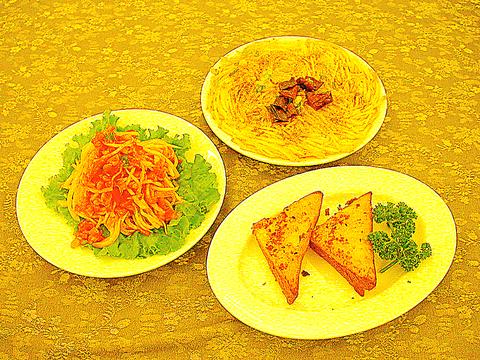Ren He Yuan is probably the most time-tested and authentic Yunnan restaurant in Taiwan. The fact that it is always full of customers testifies to the excellence of its cuisine. Although the restaurant never promotes itself as an "old shop," almost all of its regulars know that it started some 50 years ago and has moved and expanded several times because of its increasing popularity.
Trained under experienced Yunnan chefs, Ren He Yuan's cooks are good at turning seemingly homely dishes into delicacies. "There's no real spectacular or grandiose dish in Yunnan cuisine. Yunnan cuisine is composed of all kinds of homemade dishes," said Yao An-chin (姚安琴), proprietress of Ren He Yuan.
Yao knows the cooking style like the back of her hand, partly because of her background. Yao's father was a civil war veteran who took his Yunnan wife with him when the KMT government moved to Taiwan half a century ago. The veteran's community where they lived was nicknamed "Yunnan village" due to the presence of a large number of couples of that ethnic background. The community, in Taoyuan County's Pincheng, has remained one of the few places where you can find authentic Yunnan cuisine in Taiwan.

PHOTO: VICO LEE, TAIPEI TIMES
Dishes range from the exotic to the mundane. Their spicy stir-fried frogs (NT$248), tree roots with sweet sauce (NT$188), bamboo bugs with salt and pepper (NT$208) are Yunnan specialties rarely seen in Taiwan.
More common dishes such as guochiao rice noodles (NT$128) and bousu steamed buns (NT$20) are also on offer. This exclusive innovation is no less tasty than the traditional version. The buns, which come in sesame, ham and sugar filling and red bean filling, are among the best in Taipei. The sesame, ham and sugar filling is only moderately sweet but leaves a lingering taste.
One popular dish is eggplant with tomato and pork bits (NT$248). Like most other dishes in Ren He Yuan, it tastes naturally light, though the item is usually made to taste stronger and sometimes greasier in its place of origin. Frogs jumping over stone slabs (NT$288) contains peas instead of frogs, as "frog" is Yunan slang for "pea". The stone slabs are actually Yunnan cheese. However, the rarely available ingredient has been replaced by Taiwanese bamboo shoots. This has made the dish popular with the health-conscious.
As the restaurant has in recent years been increasingly popular with Japanese customers, which often outnumber local customers, it now also offers non-Yunnan dishes of fish and tofu to cater to Japanese tastes.
Although there is a long list of items on the menu, many dishes are not always available. These mostly include vegetables particular to Yunnan but difficult to import in large amounts.

Towering high above Taiwan’s capital city at 508 meters, Taipei 101 dominates the skyline. The earthquake-proof skyscraper of steel and glass has captured the imagination of professional rock climber Alex Honnold for more than a decade. Tomorrow morning, he will climb it in his signature free solo style — without ropes or protective equipment. And Netflix will broadcast it — live. The event’s announcement has drawn both excitement and trepidation, as well as some concerns over the ethical implications of attempting such a high-risk endeavor on live broadcast. Many have questioned Honnold’s desire to continues his free-solo climbs now that he’s a

Lines between cop and criminal get murky in Joe Carnahan’s The Rip, a crime thriller set across one foggy Miami night, starring Matt Damon and Ben Affleck. Damon and Affleck, of course, are so closely associated with Boston — most recently they produced the 2024 heist movie The Instigators there — that a detour to South Florida puts them, a little awkwardly, in an entirely different movie landscape. This is Miami Vice territory or Elmore Leonard Land, not Southie or The Town. In The Rip, they play Miami narcotics officers who come upon a cartel stash house that Lt. Dane Dumars (Damon)

Francis William White, an Englishman who late in the 1860s served as Commissioner of the Imperial Customs Service in Tainan, published the tale of a jaunt he took one winter in 1868: A visit to the interior of south Formosa (1870). White’s journey took him into the mountains, where he mused on the difficult terrain and the ease with which his little group could be ambushed in the crags and dense vegetation. At one point he stays at the house of a local near a stream on the border of indigenous territory: “Their matchlocks, which were kept in excellent order,

Today Taiwanese accept as legitimate government control of many aspects of land use. That legitimacy hides in plain sight the way the system of authoritarian land grabs that favored big firms in the developmentalist era has given way to a government land grab system that favors big developers in the modern democratic era. Articles 142 and 143 of the Republic of China (ROC) Constitution form the basis of that control. They incorporate the thinking of Sun Yat-sen (孫逸仙) in considering the problems of land in China. Article 143 states: “All land within the territory of the Republic of China shall